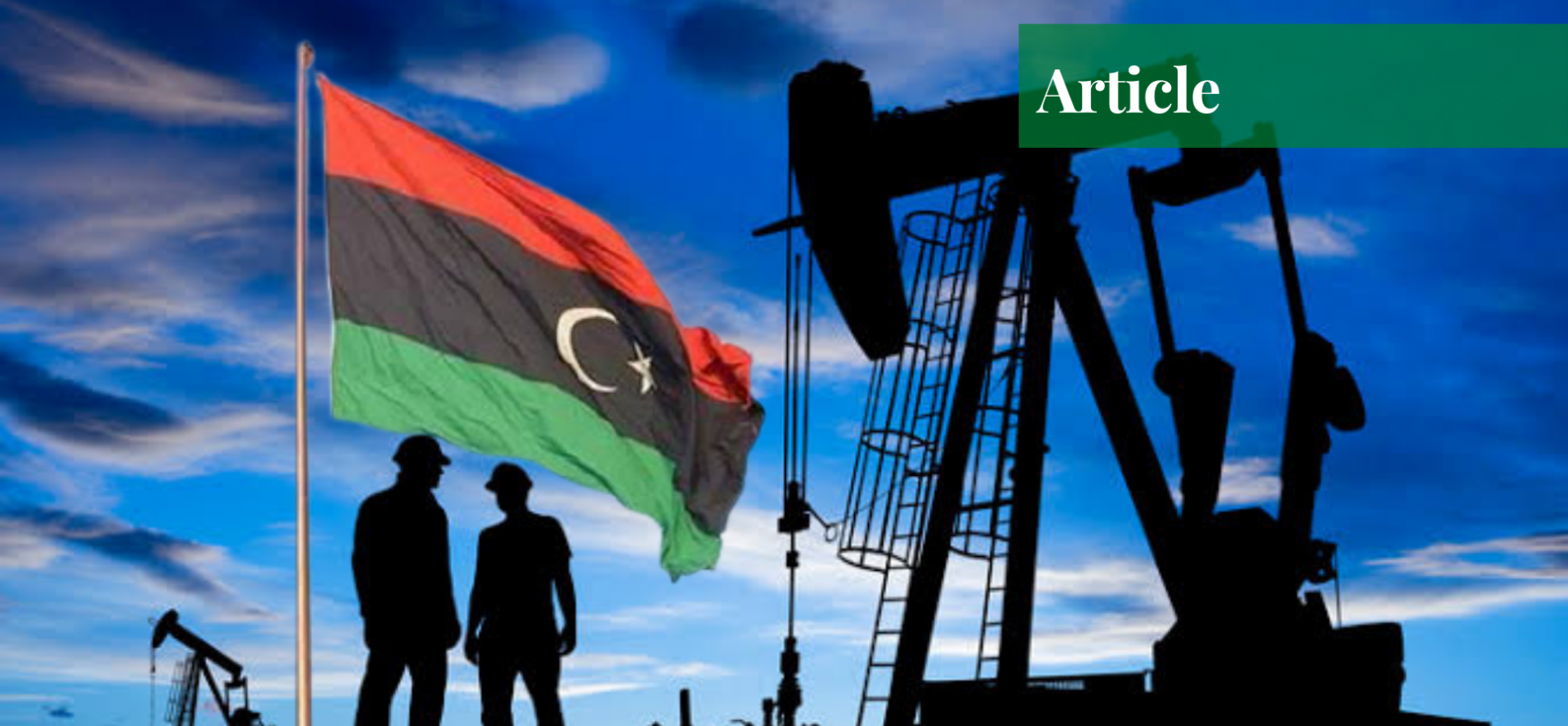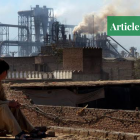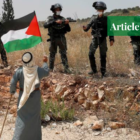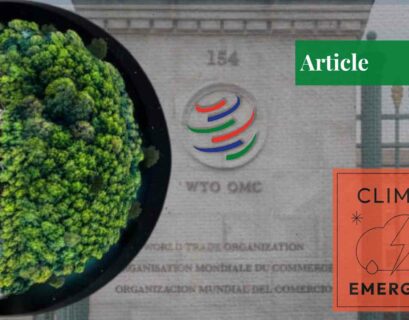Ms Ayesha Zafar is currently pursuing her Bachelor's in International Relations from National Defence University, Islamabad. She has authored multiple academic publications including research articles and book chapters. Her areas of interest include Middle Eastern politics, the geopolitics of Central Asia, and the Indo-Pacific region
Introduction
Libya today is less like a state and more like a devastated landscape for the great powers’ grand strategies. However, it wasn’t always like this; what we see today in Libya is largely the result of the western economic order that paved the way for the United States’ involvement in the territory. It allowed the energy desirous states to take full advantage of economic openness, market forces, and the removal of trade restrictions. The order allowed these states to exploit the resources of Libya, especially its oil, to gain their vested interest.
Libya’s strategic importance due to its proximity to the Mediterranean Sea and its massive oil resources has grabbed the focus of major powers, creating a struggle to attain these resources in one go. For that purpose, these states, particularly the United States, have not only used the weapon of a “capitalist free market system” but also terrorism to gain footholds in the region. Yet, to understand this, we first have to look at what Libya has to offer to these major powers.
Libya’s Significance for Major Powers
According to a survey, Libya today holds around 48,363,000,000 barrels of proven oil reserves—the largest in Africa—and produces around 499,397 barrels per day, making it one of the world’s top 10 oil producers. Hence, in this world of scarcity, where resources are depleting, the prime concern of all states is to head towards resource-rich countries like Libya and to avail of the opportunity at its fullest. This is the reason why we see the dominant powers always being involved in Libya.
For instance, it was the US that intervened militarily in the Libyan civil war, that broke out in 2011, by aiding anti-Gaddafi rebels. Not just the US, but the Pentagon officials reported that the UK has fired more than 110 missiles. Moreover, the French planes struck pro-Gaddafi forces attacking rebel-held Benghazi, and Russia imposed an arms embargo on Libya.
In 2015, the US started operations together with the UN-backed Government of National Accord (GNA) against the Islamic State of Iraq and the Levant (ISIL). Nevertheless, a deep analysis reveals that the major powers’ intention was only to gain access to Libya’s oil-rich facilities, rather than to constructively engage in the state-building measures.
Supporting Rival Factions Simultaneously
This is why we see no positive development in Libya even after years of intervention by these major powers, and to date, it is struggling to even maintain its status as a sovereign independent state. The country is still in turmoil and the consistent influence and support by the major powers to the factions at odds with each other in Libya—the GNA and General Haftar’s Libyan National Army (LNA or the Haftar group)—has made the situation even more troubling.
The GNA is supported by the US which accuses the rebels, the “Haftar group”, supported by Russia of having linkages to ISIS and the Muslim Brotherhood of Egypt. Yet, upon analyzing the United States’ role and its involvement in Libya, it is apparent that the US is playing a dual game. On one side it is supported by the GNA that has supposedly welcomed the construction of a US military base for stability in Libya.
On the other hand, the United States’ ally, Saudi Arabia, is offering millions of dollars to the Haftar group. Furthermore, the former president of the United States, Donald Trump, in a phone call on 19th April 2020, recognized General Khalifa Haftar’s role in countering terrorism. This shows the US’ intentions; in the past, it accused Haftar of supporting ISIS and carrying out terrorist attacks but now it is commending its efforts against these crimes.
This is dual policy is owed to the fact that the Haftar group, with time, has emerged to be very powerful in Libya, with control of the major oil facilities. In January, it imposed a blockade on oil which cost over $6 billion to the States Corporation Commission. Additionally, Russia’s military presence, which includes its already existing bases at Benghazi, Al-Khadin, and Al-Jufra and its plan to build new bases, poses a threat to the US’ 6th fleet in the Mediterranean.
Russia’s backing of Haftar and the presence of its private military— Wagner Group—in Libya, challenges the US dominance in the region. Therefore, the US will never take a risk when it comes to its interests in the region. As a consequence, the United States’ rationale for its involvement and military intervention in Libya was also to prevent any state from gaining complete control over Libya’s oil.
The Exploitative Order
The US’ desire to influence Libya was made possible with the economic order of the west—capitalism—that emerged successfully after the end of the Cold War. The capitalist policies of economic openness, freedom of trade, fairness, transparency, etc. not only caused small states like Libya to suffer from a devastated economy, exploitation of resources, but also led to the diffusion of transnational threats, which traumatized the peace of Libya and the region as a whole.
Therefore this capitalist system only favored the developed economies of the world that found “economic-openness” as an opportunity to exploit the resources of the smaller states in the post-colonial era. It’s nothing more than the imposition of their structure, rules, and policies on the other parts of the world.
Libya and the Capitalist Economic Order
A major criticism of the capitalist economic order is that if it is indeed progressive and advantageous to the small and poor economies then why did it distress Libya to the point of no return. Despite Libya being a member of the World Trade Organization (WTO), the IMF, and the World Bank—all institutions made to ensure the world’s economic progress under the leadership of great economies like the US, Europe, Japan— they failed to bring any positive development to the vulnerable state of Libya. Instead, their economic and trade sanctions have significantly hampered the growth and economy of Libya.
For instance, Libya, being a member of WTO, has implemented numerous trade liberalization reforms, such as reducing the number of state importing monopolies, limiting the number of import bans, abolishing licenses for most goods, and reducing subsidies. However, these policies were meant to benefit only the powerful like the US.
This can be observed in the imbalance in US-Libya trade relations. The US’ total exports to Libya are less than its imports which were worth $1.5 billion in 2019. This is how the WTO’s policies of limitation on imports ban ultimately benefit the US as it is the largest importer of Libya’s oil and petroleum products. Moreover, it is worth noting that the American foreign direct investment (FDI) in Libya was $908 million in 2019, whereas, that of Libya in the US was only $1 million.
While the WTO calls for reducing subsidies, the IMF, dominated by powerful states, proposes policies increasing subsidies. For instance, Libya’s figures for 2012 indicated that the total amount for food and energy subsidies was 9.5 billion dinars, which was equivalent to about 9.2% of the state’s GDP; while the IMF’s proposed subsidies, which included estimates on electricity and other subsidies, reached an amount of 14.8 billion dinars or 13.8% of GDP. So this shows how the major powers are only using policies of the capitalist-dominated institutions like WTO and the IMF to exploit Libya.
The Impact of the United States’ Involvement on Libya
Looking at the statistics, Libya’s GDP, which relies heavily on its oil exports (accounting fr around 69% of the GDP), was 74.77 billion USD in 2010 before the US intervention and fell to 34.7 billion USD in 2011. Furthermore, Libya’s GDP growth from that point on didn’t grow to its previous level and even in 2020, it remained at 45 Billion USD.
Since the US intervention, the ranking of Libya has significantly dropped on the Human Development Index (HDI). It now ranks 105th on the HDI, however, before the intervention Libya just had the highest HDI of any country on the continent. According to United Nations Human Rights Council (UNHCR), an estimated 1.3 million people need humanitarian assistance in Libya.
Moreover, around 33% of its population is living below extreme poverty, without access to clean drinking water or proper sewage systems. They are struggling to have their basic needs met. Libya’s unemployment rate has also considerably increased in recent years. The graph below shows the percentage of youth falling into unemployment. It can be noted that since 2011, the unemployment rate has spiked at an alarming rate.
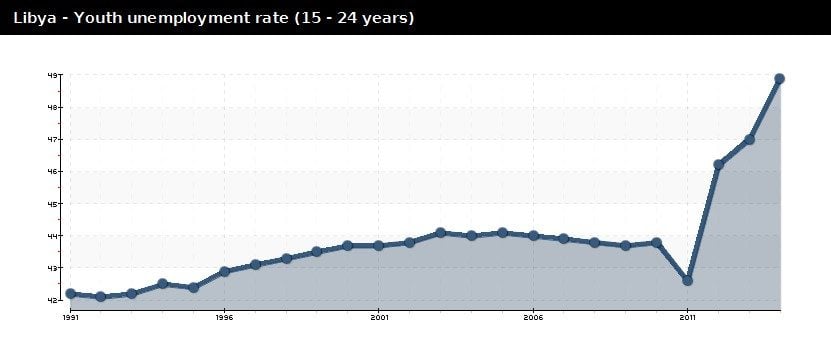
Henceforth, there is no doubt that the major powers’ policies and economic institutions have only satisfied their voracity. These policies and institutions provided them with a chance to play their cards to inhabit the oil-rich facilities and to ensure their incessant influence in the strategically significant Libya, rather than having any fruitful contribution to the economic progress of Libya.
Conclusion
Analyzing the capitalist economic order and its impact on the developing and poor states across the world gives rise to certain questions. The pros and cons of the order make you wonder if the time has come for struggling states like Libya to stand up against the dominant system of capitalism. Is it time for them to strive for a new international economic order? While these questions are yet to be answered, one thing is certain; the current economic system of the world only favors those in power and exploits the weak states to the point where they’re buried in debt, poverty, corruption, violence, and overall loss.
If you want to submit your articles and/or research papers, please check the Submissions page.
The views and opinions expressed in this article/paper are the author’s own and do not necessarily reflect the editorial position of Paradigm Shift.
